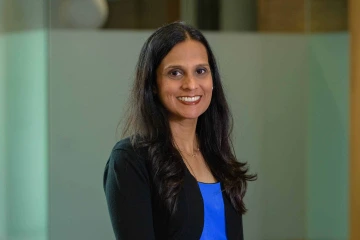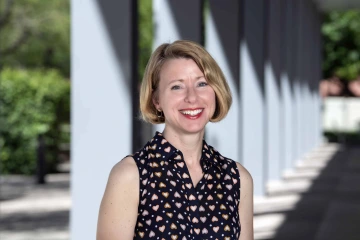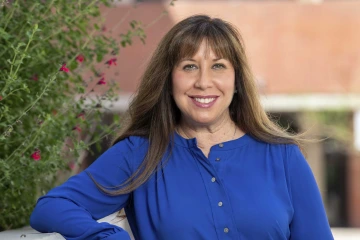Helping students navigate through school and life
Health sciences advisors play a crucial role in guiding the next generation of health care providers on to the next step in their careers.

Academic advisors help guide students to graduation and beyond.
Sometimes, Lisa Shah-Patel, MD, speaks with so much pride about her students that listeners automatically assume she’s referring to her own two daughters.

Lisa Shah-Patel, MD.
In fact, Shah-Patel, the University of Arizona College of Medicine – Phoenix‘s director of career and professional advising, is talking about the medical students she advises.
When convocations and commencements for UArizona Health Sciences colleges take place in the coming weeks, it’s not just a big day for students and their families but also for the advisors who’ve guided those students through their academic journeys.
“Every year I do this. I always get teary-eyed. You would think that I would be immune to it, but I’m not,” said Shah-Patel, who is part of a quartet of physicians from various specialties who advise medical students.
Amy Sussman, MD, also gets all the feels.
“It’s bittersweet,” said Sussman, UArizona College of Medicine – Tucson‘s associate chair of education for the Department of Medicine. “You invest so much time in them and you get to know them so well. It almost hurts when they leave.”
Sussman, who was selected by students to lead the procession for this year’s convocation on May 9, has a lot of opportunities to bond with students. As the program director of nephrology and key renal faculty, she teaches the renal block for first-year medical students. As the internal medicine student clerkship director, she works with third-year students on their internal medicine rotation. She writes their department chair letters for internal medicine residencies and serves as the American College of Physicians faculty mentor for the UArizona College of Medicine – Tucson internal medicine student association.
“You see them grow up right before your own eyes,” Sussman said. “It is very fulfilling to see them mature into these wonderful, wonderful physicians to be who are strong and confident, and they’re going off to phenomenal programs. It’s just something that really excites you because you know how fantastic they’re going to be. And that matters because these are the future physicians who will take care of us.”
Navigating beyond classes
College is a critical time in a young adult’s life, with a lot of growth and change.
“It’s a unique time of life,” said Rebecca Field, MEd, director of undergraduate student services at the UArizona’s R. Ken Coit College of Pharmacy.

Rebecca Field, MEd.
Field has been an advisor with the university for more than 20 years. She said she remembers how important mentoring was to her as a student.
“I remember the people who helped me when I was in college. The idea of being that for someone else was really exciting to me,” said Field, adding that it’s especially rewarding when students share with her how she’s helped them through their academic careers.
While advisors have always been a sounding board for students, the work has changed over the years, Field said. Advising used to be reactive.
“We were available, of course, and we did programming and we provided resources, but we were really waiting for students to come to us,” she said.
Not these days.
Field said the ready availability of student data lets advisors identify potential pitfalls early.
“In addition to serving all the students who are coming to us, we are also spending so much time running through the data looking for students and reaching out to them to provide services proactively,” she said. “That just wasn’t part of the role 20 years ago because we didn’t have the data. We’re now able to connect with students on different levels and get to those meaningful conversations more quickly.”
Shah-Patel said she and her team of advisors work to create relationships with students as soon as possible.
“Early on, we are working to help them figure out what is important to them and what are their values,” she said. “We’re helping them figure out who they really are, and, in turn, as time goes by, what specialty they want to pursue, how they can be successful in pursuing that while still staying true to their values, and what’s really important to them.”
Onward and upward
Advising can often be tricky for advisors, too. Shah-Patel said the residency application process keeps changing, which means advisors are figuring things out as they’re counseling students. Not to mention that students might be grappling with other issues – life isn’t put on hold during medical school.

Amy Sussman, MD
“It’s not something that I can teach from a textbook or a guide. Every student’s situation is completely different and their portfolio looks completely different,” she said. “It’s on-the-job training and, even now, there are some things that stump me especially given how competitive things have become. You just have to get creative with it. Think outside the box.”
Sometimes that can mean fielding student calls while watching your kid’s basketball practice or rushing through the airport on your way to a conference.
But it’s worth it, Sussman said.
Seeing students through the biggest moments of their academic careers – Match Day and then convocation – is gratifying.
“I feel so privileged because I have a small piece in their life,” she said. “I’m watching them through this process and I see the culmination of their efforts. It’s pretty exciting.
“It’s definitely the feeling of a parent, and I am the parent of two wonderful boys. I’m so lucky because I feel like I’m also the parent of 31 kids who are going into this field and watching their hard work come to fruition. It’s the best.”

